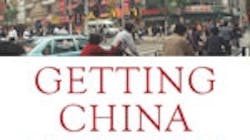Book Review of Getting China and India Right: Strategies for Leveraging the World's Fastest Growing Economies For Global Advantage By Anil K. Gupta, and Haiyan Wang, Jossey-Bass/Wiley, 2009
Having a presence in India and China isn't the same thing as being successful in these markets according to Gupta and Wang. "Many of today's Western Giants that don't have solid China-and-India strategies will face severe threats to their very existence in as little as ten years' time, as competitors who are making the most of China and India mark these companies with a bull's eye for annihilation or acquisition."
Though that might sound harsh, Gupta and Wang point out that companies whose strategy to pursue premium-end niches in an effort to "show attractive profit margins from the China and India operations in order to keep HQ executives happy," won't succeed in the long run. One reason is that there are new global players from within both India and China who have different capabilities, mindsets, capital and talent.
The authors' view of China and India involve what they call the four stories which play out simultaneously.
- Mega-Markets -- Between the two countries, they account for 40% of the world's population, 10% of the world's GDP and 20% of the growth in world's GDP.
- Cost Efficiency Platform -- Give their low wages these countries have the ability to "dramatically reduce a company's global cost structure
- Innovation Platforms -- As producers of the largest annual pools of scientists and engineers in the world, they can enable a "quantum leap in a company's technological and innovation capabilities."
- Launching Pad for New Global Competitors -- As the home base for companies eager to play on the global stage, they become "the springboards for the emergence of a new breed of fearsome global competitors."
Other companies are looking to China for services beyond cheap labor. "For us, China is not about outsourcing and cheap labor. We don't want to give them the crumbs. It's about different science. We will link our fate to their fate. Within five to ten years, we will be moving from 'made in China' to 'discovered in China,'" said Moncef Slaoui, head of R&D for GlaxoSmithKline.
P&G has pioneered another business model of innovation in working with China. The company has started distributing high-value performance chemicals to local partners who add the basic ingredients and packaging before distributing them to local retailers and consumers. The end result is large savings in transportation and energy.
The authors conclude that "successful global corporations of tomorrow will be one that figures out how to take advantage of three realities: the rapid growth of emerging markets and the increasing multi-polarity of the world economy; enduring cultural, political, and economic differences across countries and regions; and the rapidly growing integration of national economies."
Dr. Anil K. Gupta is the Ralph J. Tyser Professor of Strategy & Organization Distinguished Scholar-Teacher at the Smith School of Business, The University of Maryland. Haiyan Wang is Managing Partner of China India Institute. Getting China and India Right: Strategies for Leveraging the World's Fastest Growing Economies is available here.
